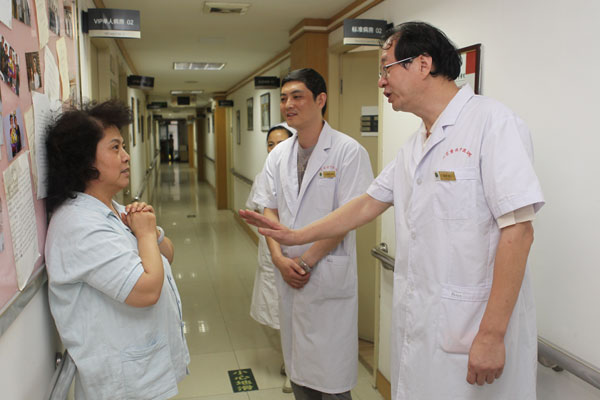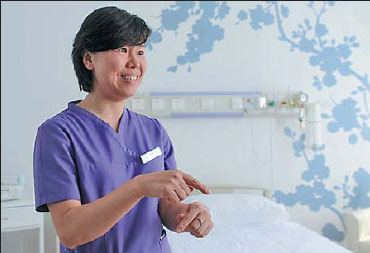Medical profession engaged in healthy debate over nature of care, reports Yang Wanli in Beijing.
While job-hopping is quite common, few medical professionals make the switch from a public hospital to a private one. A position in a public hospital has traditionally been regarded as an "iron bowl", offering long-term employment.
 |
|
Huang Shu (right), is a well-known spine surgeon who left a public hospital in northwest China in 2002 and set up a private hospital in Beijing, which provides his own unique treatment and receives about 300 patients every day. Huang says private hospitals need more policy support. Photos by Feng Yongbin / China Daily |
Yang Jie is one of the exceptions. While working in a public hospital in the 1990s she was chosen by the Beijing Health Bureau to go to Singapore to study nursing. After two years in Singapore she decided she wanted to work in a private hospital when she returned to Beijing.
|
 Yang Jie, a 41-year-old nurse who works at Beijing United Family Hospital, one of the few private general hospitals in the city.
|
"My colleagues said I was crazy," the 41-year-old nurse said.
"Even my parents spent several weeks trying to persuade me not to go to a private hospital. They said a private hospital could close at any time."
There were only a few private hospitals in China at that time, mostly treating venereal diseases, and many had bad reputations.
Yang, who now works at Beijing United Family Hospital, a private general hospital in Beijing, which is a joint venture between US-headquartered healthcare provider Chindex International and the Chinese Academy of Medical Sciences, said it was her experience in Singapore that made her decide to change to a private hospital.
"I had never fed patients or cleaned a bedpan before in my five years working in Beijing," she said. "Two years in Singapore changed my attitude toward nursing and I really wanted to promote such patient and family oriented services in my country."
Yang said that in Singapore hospitals, about a dozen of patients are cared for by two staff nurses, who do daily medical checks and give status reports on the patients' condition to the doctors. Two assistant nurses are in charge of tasks such as giving injections. The cleaning work is done by another group called house attendants.
"In China, nurses have to do all these and there is such a high number of patients that there is no time to give them the attention they need," Yang said.
Even though she has now been working in the Beijing United Family Hospital for 15 years, Yang said that many of her friends in public hospitals don't want to make the change because they still have concerns about working in a private hospital.
Better service, higher cost
However, more and more Chinese patients are now using private hospitals and clinics, as private healthcare providers have developed a reputation for having a better service than public hospitals for those that can afford to use them.
Sharon Liu, 34, who lives in Canada but wants to deliver her baby in Beijing so she has the support of her family, said her experience of a public hospital was so unpleasant that she burst into tears as soon as she got outside.
In order to make an appointment with one of the top doctors, Liu said that she got up at 6 am. "But there were still 20 or more patients waiting, and less than 10 seats were available for those waiting."
